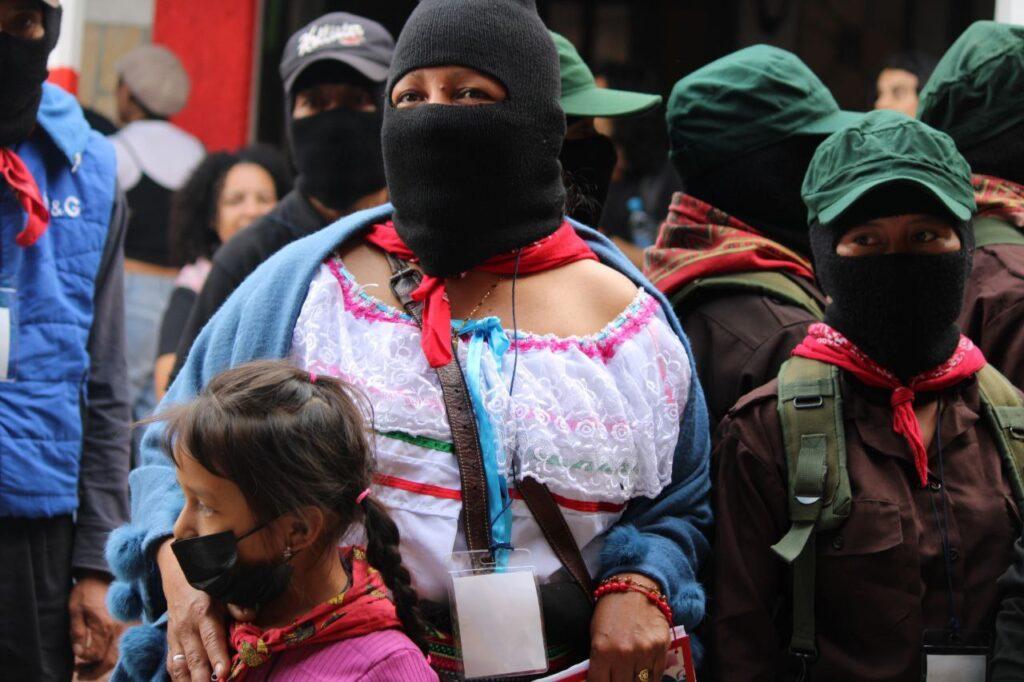
The decision of the Zapatista Army of National Liberation (EZLN) to organize last December 28 and 29 the International Meeting of Rebellions and Resistance, in the Cideci-Unitierra of San Cristóbal de las Casas, to conclude in the caracol of Oventik from December 30 to January 2, 2025, was a very wise one.
This, notwithstanding the context of violence in Chiapas that had led them to raise the possibility of suspending a program of meetings starting with the one related to their 31st anniversary. Its content resumes the meaning of the writings of the EZLN throughout the year: The storm: the crime, the executioner and the victims, The Mexico chapter, Zapatista rebellion and resistance, Genealogy of the Zapatista commons, and its first steps.
The insurgent subcomandante Moisés shared lessons from the experience of the European tour. The panel of Zapatista women who analyzed the trajectory of their struggle and the changes they have achieved without omitting challenges to the full understanding of this gender dimension was significant. The meeting provided a broad outline of the organizational construction over 31 years, and the voice of the Zapatista leadership was incorporated into this exercise.
It highlighted the participation of Subcomandante Moisés, Captain Marcos, members of the Clandestine Revolutionary Indigenous Clandestine Committee and a group of Zapatista women, as well as around a thousand attendees.
The theme addressed by the guests in the case of Mexico offered an overview of the serious situation of violence with its web of impunity in the face of crimes, dispossessions and alarming statistics of disappearances. This provided a critical look at the so-called 4T and its megaprojects, such as the so-called Tren Maya, the Interoceanic Corridor and the manipulation of the official discourse that these will be the way to finance the continuation of the programs that in the case of what they call Sembrando Vida is already provoking the commercialization of the land and even its monopolization.
Captain Marcos spoke of the ravages of climate change in the world, such as the increase in cyclones, extreme droughts, plundering and despoiling of ecosystems due to the demands of economic growth. He pointed out that forests are dying on a massive scale and productive lands are being degraded; the serious contamination of soil, water and air is advancing unchecked. Some speeches invited to consider strategies to increase the participation of other sectors, such as young people, especially indigenous people.
Insurgent Captain Marcos called for a discussion with preparations, but with simplicity, so that the message of resisting against crime and criminals and defending the victims can reach all sectors in Mexico and other countries facing the onslaught of the system.
In the account of insurgent Captain Marcos, La cofa del vigía (The Watchman’s Crow’s Nest): a long view looking to the past, he warned that antagonistic sectors have announced for decades the imminence of the disappearance of the EZLN. Incapable of acknowledging the signs of their strengthening in the context of the counterinsurgency that has not ceased.
The crucial decision of the EZLN to join the unilateral ceasefire decreed by Carlos Salinas de Gortari before the massive mobilization that demanded it on January 12, 1994, meant a watershed that despite the attacks and provocations such as the Zedillo’s betrayal on February 9, 1995, among many others, such as the current ones against the recovered lands, has allowed the construction of its autonomy.
The EZLN pointed this out: instead of dedicating ourselves to training guerrillas, soldiers and squadrons, we prepared education and health promoters, and the foundations of autonomy that today amaze the world. Instead of building barracks, improving our weapons, building walls and trenches, we built schools, hospitals and health centers, we improved our living conditions.
Instead of fighting to occupy a place in the Parthenon of individualized deaths from below, we chose to build life. (“Between Light and Shadow,” Subcomandante Insurgente Galeano. Enlace Zapatista, Mexico, May 2014). Consequently, the call of Captain Marcos was not incongruent when he said: “we say free Palestine, and that means free from war, but also from those who tell it what to do and how” and that the war “must cease now, because it has left many victims under the rubble.”
The meeting was far from self-satisfaction, especially when addressing the internal problems of their structure, which they call the pyramid, and which led them to propose other ways of repositioning the participation of the people.
The correctness of their choice of the path of peace in the anti-capitalist construction of autonomy and struggle for life was demonstrated. We await the message of December 31 to wake up on January 1 with the next steps to advance in the common without privatization of the land.
Original text by Magdalena Gómez published in La Jornada on December 31st.
Photos by Pozol Colectivo.
Translation by Schools for Chiapas.